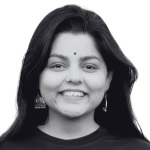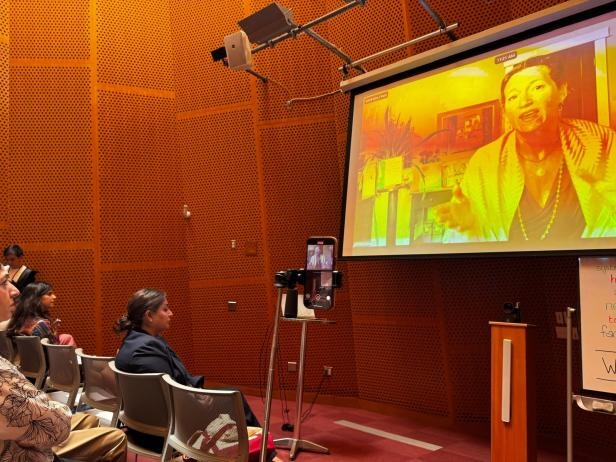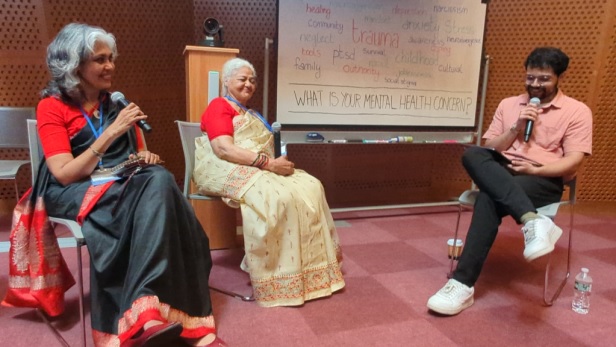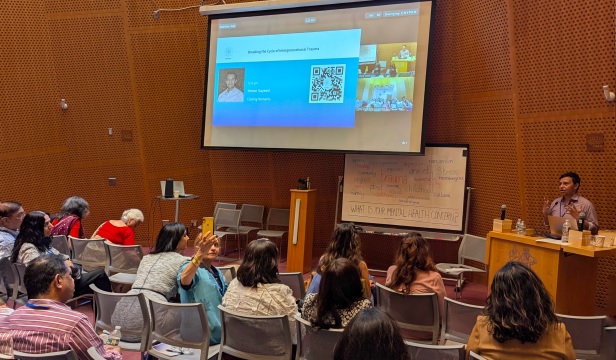

A whiteboard listing words that capture a silent struggle - Photo by Beena Sarwar
India-Pakistan Tensions: Experts Link ongoing Conflict to Unhealed Intergenerational Trauma
By Pragyan Srivastava
Sapan News

As India and Pakistan emerge from yet another militarized confrontation, with communal tempers inflamed and political rhetoric boiling over, amplified by media and social media, could unhealed trauma on either side be driving the aggression?
This question arose at a groundbreaking seminar on Breaking the Cycle of Intergenerational Trauma, organized by SAPNA , the newly formed South Asian Psychology and Neuroscience Association.
Held in the Boston area at the prestigious MIT, the Massachusetts Institute of Technology, Cambridge MA, moving and thought-provoking discussions at SAPNA’s inaugural event on May 3 cut through the noise of nationalistic bluster and media frenzy dominating public discourse at the time.
The conversation on intergenerational trauma reminded journalist Beena Sarwar of the war-like situation then raging between both countries.
“Are the leaders of these nations themselves carrying unresolved trauma that’s shaping their behavior?” she asked.

Clinical psychologist Dr Arielle Shwartz online at ‘Breaking the Cycle of Intergenerational Trauma,’ MIT, 3 May 2025 - Photo by Beena Sarwar.
The question drew applause from the more than a hundred strong, in-person audience, and a sobering response from reputed clinical psychologist Dr Arielle Schwartz, joining online from her base in Boulder, Colorado.
“Yes, we often overlook how trauma — especially unhealed trauma — shapes not only individuals, but also systems and nations,” responded Dr Schwartz, who specializes in trauma and resilience.
“Many world leaders exhibit traits consistent with narcissistic personality structures, which are often rooted in early wounds and insecurity. The danger arises when these traits remain unchecked, especially in those with immense power.”
Her response brought more than one political leader to mind.
Dr Shwartz suggests that what’s urgently needed is a shift in leadership paradigms — a pivot away from dominance and control, toward empathy, presence, and relational strength.
It’s about “the return of feminine leadership attributes: compassion, collaboration, listening, and care,” she explained. “These are the traits that nurture peace, not war” regardless of a person’s gender.
Dr. Schwartz was among the global experts in psychology, neuroscience, mindfulness, and social justice brought together thoughtfully by organizers of the day-long Saturday seminar, entrepreneur and educator Imran Sayeed and pharmacist and product manager in health tech Neha Katyal. That the co-organizers are from Pakistan and India respectively speaks to the potential of collaboration when people from both countries are allowed to meet and work together.
Many audience members were moved, some to tears, during the course of the day as speakers and panelists explored how trauma, especially when passed down through generations, shapes identities, institutions, and interpersonal relationships. Participants also had the opportunity to deliberate these ideas in smaller groups at breakout rooms facilitated by experts like Dr Pauline Peck, an Iranian-Armenian American who earlier shared her own story as a child of Middle Eastern immigrants.

Intergenerational panel at the ‘Storytelling for healing’ segment: (L-R) Beena Sarwar with her mother Prof. Zakia Sarwar and moderator Furqan Sayeed, a former volunteer editor at Sapan News - Photo by Pragyan Srivastava
For South Asia, a region haunted by the ghosts of Partition, colonial violence, and communal distrust, the insights offered were more than academic. They were urgent, especially with the ongoing hostilities between nuclear-armed Pakistan and India.
In this context, the question about the unhealed trauma of political leaders served as a bridge between the micro and the macro, between family trauma and state behavior.
The personal is political — and regional
When leaders in India and Pakistan exchange barbed threats rather than open hands, when media narratives fan war hysteria rather than empathy, and when young people grow up seeing “the enemy” across the border rather than a mirror, it is worth asking: Whose pain are we replaying?
Panelists consistently returned to the idea that healing begins with awareness, and that awareness must be cultivated both internally and institutionally.
“We are all handed stories,” said entrepreneur Brijesh Patel, one of the panelists at the ‘Healing with storytelling’ segment. “But not all those stories are ours to keep. Some must be examined, healed, and released.”
If the current leaders of South Asia are clinging to stories of betrayal and trauma — whether personal, national, or inherited — then it falls upon citizens, civil society, and future generations to script a different ending.
Reflecting on these conversations, one thing is clear: what South Asia faces is not just a geopolitical crisis, but a psychosocial rupture — one that mirrors unresolved grief, inherited fear, and the trauma of a subcontinent divided by violence.
And yet, as Dr Schwartz noted, the trauma endows us all, besides pain, with resilience.
To activate this resilience on a national and regional scale requires more than summits and treaties. It requires transformational leadership — leaders willing to break the cycles of trauma, who do not confuse strength with cruelty, and who see in their neighbor not an adversary but an echo of themselves.

Co-organizer Imran Sayeed giving closing remarks at the SAPNA Intergenerational Trauma seminar, MIT, 3 May 2025 - Photo by Pragyan Srivastava.
For SAPNA and the South Asia Peace Action Network, Sapan — networks rooted in collective healing, dialogue, and justice — this moment is not one of despair, but of awakening.
As Sapan co-founder Beena Sarwar said, “Peace is a process, not an event. It can’t be pursued passively. We have to keep working at it relentlessly, together.”
As South Asia stands at a crossroads, the path forward lies not just in political accords but in confronting the shadows of its past. Healing requires more than ceasefires — it calls for courage, empathy, and the willingness to rewrite inherited narratives.
The question is: Are we ready to break the cycle?
(Sapan News associate editor Pragyan Srivastava is a journalist from Lucknow and a recent Fulbright-Nehru Master’s scholar at Rutgers University.)
This is a Sapan News syndicated feature.

